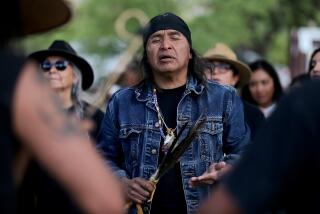Bahia Emerald case may proceed despite Brazil’s efforts, judge rules
A Los Angeles Superior Court judge ruled Monday that a trial to determine ownership of the prized Bahia Emerald will continue in Los Angeles despite ongoing efforts by the government of Brazil to return the gem to its country of origin.
The 180,000-carat, 840-pound behemoth has been the subject of a contentious court battle between a colorful cast of gem traders, miners, real estate tycoons and others vying for the jewel once valued at $372 million.
The gem, unearthed in 2001 from a mine in the state of Bahia in eastern Brazil, is a hulking mass of rock with tubes of protruding green crystals. It is among the largest unbroken stones of its kind.
Last year, just as the court saga surrounding the emerald seemed to be nearing a conclusion, Brazil stepped up to stake its own claim to the stone.
The Brazilian government last year asked a judge to dismiss the case outright or put it on hold while Brazilian officials continue negotiations with the U.S. government to secure the stone’s return.
Brazil’s Los Angeles-based lawyer, John Nadolenco, told the judge that a decision in Los Angeles Superior Court would significantly hinder Brazil’s ongoing discussions with the federal government.
“But there is one complication--this case,” Nadolenco said.
Judge Michael Johnson made clear Monday that he was not ruling on the merits of Brazil’s claim to ownership, but instead solely on the motion to dismiss or pause current court proceedings in Los Angeles.
Brazil’s motion lacked sufficient evidence to warrant halting the case, Johnson said. There was no official declaration from Brazilian officials, nor was there any indication that diplomatic efforts would prove fruitful or timely.
In addition, there is strong interest in a prompt decision in Los Angeles, Johnson said.
“The county of Los Angeles, which has housed the emerald at taxpayer expense, is entitled to a decision,” Johnson said.
The Brazilian government entered the fray in September, saying that all other ownership arguments are irrelevant. The emerald, the South American nation claims, was illegally mined and exported.
This interrupted the efforts of Kit Morrison, an Idaho businessman who was last in possession of the gem after its long, tortuous and often bizarre journey.
After its discovery in 2001, miners transported it to Sao Paulo, where it began an eight-year odyssey, in which it repeatedly changed hands.
In 2005, the gem was shipped to a self-trained geologist and mining entrepreneur in Northern California who knew the original miners. He said he shipped it to New Orleans, where Hurricane Katrina submerged the stone for weeks near the French Quarter.
After fishing it out, the man somehow lost possession of the gem, and it eventually ended up in the hands of Larry Biegler, an investor from Paradise, Calif.
In 2009, Biegler reported it missing from a South El Monte vault. Los Angeles County sheriff’s investigators tracked the emerald to a Las Vegas vault, where it was stored by Morrison and associate Todd Armstrong.
Sheriff’s investigators could not sort out who owned the gem, so they confiscated it – setting off years of litigation, in which eight different people at one time or another claimed ownership.
Since then, the gem has been held in an undisclosed Sheriff’s Department location.
Through the years, some court claims -- such as those of a man who said his proof was on a piece of paper destroyed in a house fire -- were dismissed by a judge. Other people agreed to settle their claims with competing parties in return for a cut of possible sale profits.
A group led by Morrison, the Idaho businessman, was the only other party left in the legal case before Brazil entered the fight.
Morrison’s attorney, Andrew Spielberger, said that his client and Armstrong purchased the gem from Biegler, paying seven figures, and are the rightful owners.
“I’m happy for my client,” Spielberger said. “Now they’ll have to wait until a judgment.”
Brazil has other options in its efforts to get the emerald, Spielberger said. If the judge rules that his client is the rightful owner, Brazil could still seek to repatriate the emerald, but would have to provide compensation to his client.
“They have to pay to repatriate--you can’t just take it,” Spielberger said.
The judge did leave open the option for Brazil to enter an appropriately documented claim at ownership, which would be considered. Until then, the case can proceed, he said.
“Though this obviously wasn’t the ruling we were hoping for, we are not at all surprised that the court feels invested in continuing the case after so many years,” Nadolenco said. “Brazil is heartened that the judge recognizes Brazil’s interest in the emerald and has given it an option to pursue that interest.”
Brazil has said that the emerald has immense cultural importance and should be on display there.
For court news, follow @sjceasar.
More to Read
Start your day right
Sign up for Essential California for news, features and recommendations from the L.A. Times and beyond in your inbox six days a week.
You may occasionally receive promotional content from the Los Angeles Times.







